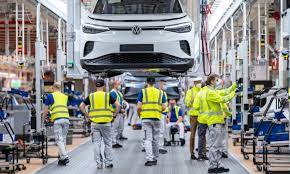Yanis Varoufakis
Inglorious procrastination is one of the European Union’s standard responses to major crises. This is not merely due to the difficulty of getting 27 prime ministers and presidents to agree on something. It is also because of their motivated tendency to ask themselves the wrong questions, and thus head slowly but inexorably to self-harming policy solutions.
After the demise of Lehman Brothers in 2008, a group of policymakers gathered in Washington to ponder the relevant question: “How do we bail out the bankers to stop them consuming us?” In Brussels, meanwhile, a much larger group mused for years over a toxic version of the same question: “Given that EU rules prohibit bailouts, how do we maintain the pretence we are respecting them as we bail out the bankers anyway?” The result was a costly delay, and policy choices which ensured that, whereas in 2008 European total income exceeded the US’s by 10%, by 2022, Americans were earning 26% more than Europeans. Today, the EU is about to repeat this self-harming act in response to another unforeseen blow that struck Brussels a year ago. Last August, Joe Biden signed into law the misleadingly labelled Inflation Reduction Act, which will release hundreds of billions of dollars of subsidies and tax breaks, over a decade, in support of US industry’s green energy transition. (Estimates for its total value range from $500bn to more than $1tn.) In one fell swoop, Washington had torn up the so-called Washington consensus: the light-touch free trade and industrial policies that the US and Europe had been foisting on the global south for decades. Suddenly, large unilateral subsidies were introduced by a US government that felt no obligation to keep the rest of the world in the loop – the EU included.
The EU’s bureaucrats and politicians were livid. Overnight, the whole of Europe’s mighty manufacturing sector faced tall fences impeding access to the vast US market. The problem went far beyond the impact on German carmakers, whose electric cars became ineligible for the up to $7,500 subsidy that cars assembled in North America will benefit from. By subsidising all domestic battery production, Washington ensured that every manufacturer across the US will face lower energy costs than their European competitors. The shivers down EU policymakers’ spines were exacerbated by the news that, not long after Biden’s act came into force, the world’s largest chemical producer, BASF, decided to curtail its operations in the EU while Tesla put on hold the completion of a major battery manufacturing plant in Germany. Europe’s rapid deindustrialisation suddenly loomed large on a bleak and inauspicious horizon.
It is hard not to pity the EU’s top brass. They thought that once Donald Trump was out of the White House, Washington would treat them as partners. They expected the Biden administration to endorse Brussels’ preference for carbon taxes and pricing schemes that, unlike subsidies, encourage not just more clean energy but also overall energy savings. They believed that the circle around Biden would appreciate the readiness with which, following Putin’s invasion of Ukraine, Europe cut itself off from dirt-cheap Russian natural gas to spend billions on the expensive fracked oil and liquified natural gas Europe now imports from Texas and New Mexico. What is not easy to sympathise with is that, as in 2008, the EU’s decision-makers are indulging their penchant for inglorious procrastination, thus inflicting further damage to Europe’s already diminished prospects. A whole year after the Inflation Reduction Act was activated, the EU response remains in limbo. Some have argued that this contrast is an exaggeration, since the EU, unlike the US, already had a Green Deal in place, involving funding pledges not too dissimilar to Biden’s. Alas, the devil is in the detail: the EU’s Green Deal offers up to €1tn of pledges that – unlike the funding offered in Biden’s act – is not actual money, but rather a fictional number akin to the notorious Juncker plan, whose pledged €300bn of new investment funds never really materialised.
The argument that Europe offers equivalent subsidies to every electric car sold in the EU is also shaky. A closer look reveals two key differences. First, in the US, subsidies come from the federal government, which means that domestic producers do not face discrimination depending on their location; in the EU, subsidies are grossly uneven and reliant on the fiscal health of each member state. Second, in the EU all electric cars receive the subsidy, including US-produced Teslas. By contrast, in the US no EU-produced zero-emission vehicles qualify for the subsidy. Why is the EU not following the dictum “if you can’t beat them, join them”? Why not offer the same subsidies Biden made available to US-based manufacturers to companies manufacturing in the EU? The reason is that, unlike carbon trading schemes that pay for themselves, subsidies require a common budget, lest Portuguese or Slovenian manufacturers receive much lower subsidies courtesy of their governments’ relative impecunity. Without a common money pot for EU-wide manufacturing subsidies, Washington’s choice to discriminate against EU manufacturers will lead richer European governments to massively discriminate against the manufacturers of poorer members. And without a common treasury, it is impossible to replicate in the EU what the Inflation Reduction Act is accomplishing in the US, with the active involvement of the US treasury department.
Three pieces of legislation are in the pipeline promising a decent EU response to Biden’s act: the Net Zero Industry Act (which will cut red tape and drop state-aid rules), the Critical Raw Materials Act (which focuses on rare earths and other materials crucial to green tech), and reforms of the European electricity pricing model (which has given a great boost to private oligopolies at the expense of both industry and the struggling classes). While the jury is still out on these, two things are clear already: first, the EU cannot afford the billions it would take to compensate industry for its intolerably delayed response. Second, the EU’s leaders will never create the common treasury the EU needs, even if the alternative is calamitous (ie, exactly as in the eurozone crisis). As long as climate disaster does not lead to our species’ extinction, Europe, I have no doubt, will bounce back. I don’t know how or when. What I do know is that we are very close to condemning one or more generations of Europeans to persistent underdevelopment.
The Guardian







